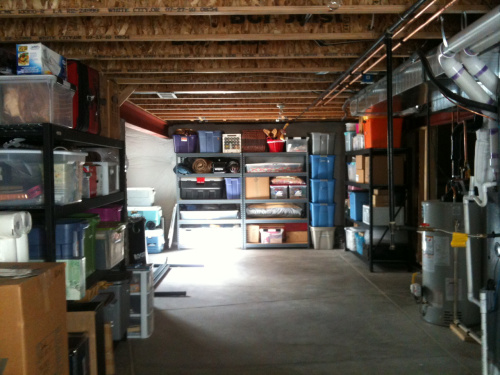Basement Organization Tips

A cluttered basement does you no good. The clutter makes it less useful as storage space since you will not be able to find anything easily. Furthermore, clutter can make access difficult if equipment such as a furnace needs to be serviced.
Taking Inventory of Basement Clutter
Before you actually start the work of organizing your basement, you should take stock of what’s down there. Maybe some of it is worth keeping, but it is very likely that much of it consists of items that you do not need. Your first goal is to sort through it all and decide what you need and what has to go. Clearing an empty spot for sorting is a good idea.
As you sort, you should ask yourself a few questions about each item, like:
- Will this item ever be useful to me again?
- When was the last time I used it?
- What would the consequences be if I got rid of it?
- Do I have something that serves the same purpose that I am actually using?
The answers to these questions may help you decide where each item winds up.
You will need a system for organizing your basement space as well as the items you decide to keep. Tools for organization include:
- Shelving
- Labels
- Boxes (plastic, not cardboard)
- Wall hooks
These tools will help you place items where they belong so that you can find them quickly and easily. Books can be placed in clearly marked boxes on their own shelf, as well as cookware, tools or any of the other possessions that comprise your clutter.
Labeling and Organization
Organize your basement into subsections for the items that you are keeping. Shelving and wall hooks are helpful for this. You will want to keep similar items in the same area to make them easier to find. You should ensure that the pathways to the items you use regularly are kept clear, as well as the pathways to your furnace and other equipment.
Importance and frequency of use should determine where items are placed. Items that you use regularly or may need in an emergency should be placed up front; rarely-used seasonal items may be stored in out-of-the-way spots. As you place items into containers and onto shelves, you should label them and make sure that they are positioned with the labels facing outward.
Protecting Your Possessions
Keep the potential for damage from flooding in mind and note that even without flooding, basements are often damp. Any items that may be damaged by moisture should be stored in plastic containers; if they are very valuable to you, you may want to consider storing them in another part of the home or in a personal storage unit.
Paring down your possessions and properly organizing them will likely leave you with some extra space in your basement. You get extra square footage to use however you like; depending on your needs, I it can be like adding another room to your home. The key is to maintain the organization of your basement to make sure that you do not lose that space again.
Organized basement inspiration by Jessica Bold via Creative Commons
